There was pandemonium in the House of Representatives yesterday when members debated a bill seeking to amend Section 308 of the 1999 Constitution which confers immunity on the executive arm of the Nigerian government. The sponsor of the bill is proposing immunity for leaders and principal officers of the House.
The Muslim Rights Concern (MURIC) rejects this attempt to shield lawmakers from the law made by them. It is despicable, outrageous and preposterous. Simply put, it is legislative rascality. This legislature will go down in history as the most controversial, most self-centered and most unproductive.
Coming at a time when the leadership of the National Assembly (NASS) is facing court trial over criminal charges, the timing of the bill is not only suspect, it is also infantile and provocative. The proposed bill is self-serving and politically motivated. Its authors seek to gain from the bend what they could not get from the straight. This bill belongs to the dustbin of history
The NASS is taking Nigerians for a ride. We will not allow that to happen. The proposed bill is a reactionary measure. It is designed to take Nigeria back to the Stone Age. Bothered by the concentration of too much power being wielded by presidents, democracies around the world are seeking to remove immunity even from the executive.
The supreme court of Guatemala successfully stripped its president of immunity in September 2015. How can Nigerian legislators turn themselves into tin gods at a time like this? It had better not be. Whoever wants to enjoy the immunity clause should go to his state and contest for governorship.
We are aware that in the year 2013 a committee of the same House recommended the expunging of the immunity clause for the president and his vice in order to check executive lawlessness. What happened between then and now? How can the present House confer immunity on those who hitherto did not enjoy it? We smell a rat.
It is a calculated assault on two of the basic principles of democracy, namely, probity and accountability.The masses are being skinned alive. First, we cannot hold the executive arm of government accountable until after the end of its tenure and now, the legislature wants to dig in deep. It is not only daylight robbery but also an attempt to subject the citizenry to the tyranny of Draconian legislation. Those who make the law must submit themselves to the same law. Only thus can they have a taste of the pudding.
The refusal of the Speaker of the House to subject the bill to a voice vote is undemocratic and most condemnable. Honourable Dogara wants to turn Nigeria into a huge Animal Farm where all animals are equal but some are more equal than others.
The conduct of some of the members of the House who support the bill is disgraceful. The alleged use of vulgar language by Hon. Dino Melaye and his alleged threat to beat up a female colleague in the House is most unbecoming of the status of a parliamentarian. His belligerence constitutes a threat to the continued involvement of Nigerian women in politics.
MURIC calls on female politicians and feminists across the country to speak up on this unprovoked assault on womanhood. The Speaker must call Melaye to order. In addition, female members in the NASS must insist on getting an apology from Melaye.
To sum up, we charge the House of Representatives to throw out the self-serving and politically motivated bill. We urge Nigerian lawmakers to avoid widening the disconnect between them and the electorate, desist from unnecessary confrontation with the executive and adhere to international best practices in parliamentary matters.




 Premier League
Premier League